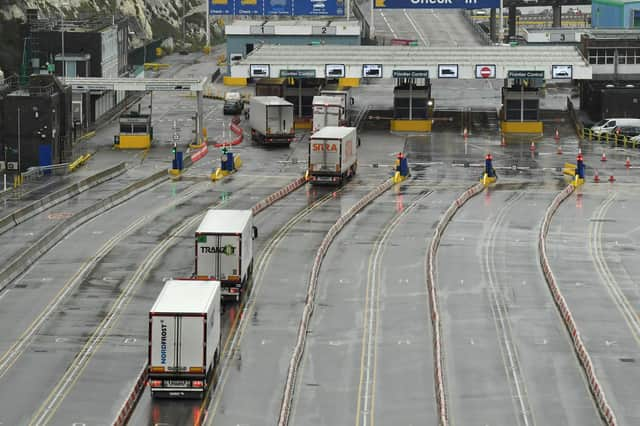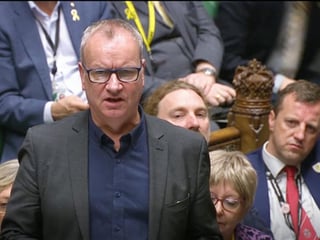Brexit: Why businesses were not able to plan ahead for the disruption caused by this act of national self-isolation – Laura Waddell


An email lands in my inbox. It is from an industry newsletter asking whether I’d like to comment on how my employer, Tramp Press, is coping with Brexit. Publishing is not an industry particularly welcoming of Brexit, often openly hostile and downright despairing, but all the same, as I send what I’ve drafted to my colleague Lisa, I ask, “too spiky?”
Already we are experiencing delays in stock entering the country; books that we hastily reprinted, after a successful run up to Christmas, reached Ireland just fine but in their approach to the UK floated somewhere in limbo for a few extra days.
Advertisement
Hide AdAdvertisement
Hide AdWe are trying to capitalise on good press for an award-winning book; time is of the essence, and for a small press, every sale matters. While crossing my fingers I try to reassure our distributor, who in turn tries to reassure bookshops that have placed orders, who in turn try to reassure customers looking for them, that the books will be along soon. Other customers, casually browsing, will simply choose something else if our product is not in stock to catch their eye.
With the added complications of Covid, regular post in the meanwhile goes utterly awry. We are already avoiding having to use it. As for the extra layer of bureaucracy, we only hope we’re getting it right. Adverts on preparing your business for Brexit were vague, as we have come to expect from all Brexit wording and planning, following news stories of civil servants despairing at the mountain of legislative work still to do. Somehow industry seminars run by the UK government were even more useless, with the regular refrain “wait and see what happens” offered up as advice.
Well, here we are. Waiting to see what happens by crashing into it. Driving through the fog to discover obstacles. And neither my colleagues in Dublin, nor myself looking after our UK operations from my base here in Scotland, want to be dealing with this.
Certainly we didn’t vote for it. We are a small outfit, priding ourselves on an impeccably curated list of books published each year, each of which we fully believe in and focus our all on, but we are growing year on year and the UK is our second biggest consumer market, just as for many UK based publishers, Ireland is their second biggest market.
Being small, we are also able to be nimble. There are whispers that publishers much, much bigger than us are struggling with stock transfers between the UK and Ireland, and that some have paused for the time being. Interruptions are a problem for us all. We are small fry, compared to big business. But even we are seeing what a headache it is already to do business in Brexit Britain.
As a side gig, I lecture in publishing studies. Student essays are in, and marking them is a new experience for me. It has been a while since I’ve been a novice in a professional setting, and I struggle with it: I’m used to critiquing a piece of writing, but pegging it to a numerical grade is a different matter, and I try to get to grips with what constitutes a 62 per cent grade versus a 74 per cent.
I spend a week’s evenings assessing. In their conclusions, students were asked to predict what publishing in 2025 will look like. A common thread throughout many of the submissions highlights how Covid has impacted the industry, exacerbating and speeding up existing trends, such as flexible working, deployed before this in an attempt to decentralise operations from glossy London HQs and introduce a bit more geographical diversity. But no one attempts to predict how Brexit will impact the industry. I do not blame them. With so little information to go on, they would lack the quality sources to back up any forecasting.
I start to wonder if we are conflating some of the early impact of Brexit with what is happening with Covid. Under the virus, we have gotten used to mail delays and slower deliveries, and assorted disruptions to everyday life. Were we living in virus-free times, it might be clearer to see what a drag Brexit already is, all by itself. Working for a company based in an EU country (Ireland) is giving me a little insight into what constitutes a Covid delay there, and a Covid plus Brexit delay here.
Advertisement
Hide AdAdvertisement
Hide AdThen there are the festivals, up in the air. From the vantage point of spring 2020, when Covid kicked off in earnest, many of us too optimistically assumed that by now, the virus would have dissipated and events would be back to normal.
A key component of the marketing of any book, publishers and booksellers have done their damnedest to go online, rather than do away with launches altogether. But beyond limitations Covid places on travel, what will arts festivals look like under Brexit?
Before all this, they were already struggling with visas; the Edinburgh International Book Festival has already been lobbying for reform after some of their authors and illustrators were blocked from entering the UK. Brexit is not going to improve the situation. Touring musicians have been especially vocal about impact on their income; they’ve received callous, shallow answers from the government.
I think about all the people I’ve worked with, in the books industry, from European countries. My friends. Those integral to the operations of our small, close-knit world. The festival programmers. The researchers. The editors. All of whom have had an anxious few years waiting to find out how their right to live and work here will be impacted. The persistent strain.
So congratulations, Britain. You’re now the shallow backwater you wanted to become. Cut off, isolated, and petty. It wasn’t worth it. It was never worth it.
A message from the Editor:
Thank you for reading this article. We're more reliant on your support than ever as the shift in consumer habits brought about by coronavirus impacts our advertisers.
If you haven't already, please consider supporting our trusted, fact-checked journalism by taking out a digital subscription.
Comments
Want to join the conversation? Please or to comment on this article.
